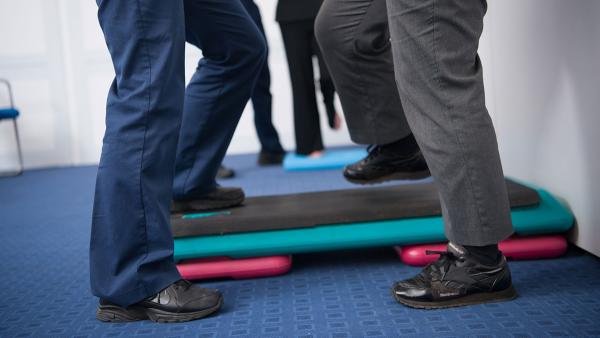Don't ignore work-related stress – there are lots of ways to reduce the common causes of stress among physiotherapists, or eliminate them entirely
On this page:
Short staffing and overwork

There are a number of actions you can take if you or your colleagues are stressed because of staff shortages:
- Ask your manager to develop an escalation policy, setting out what services get withdrawn when short-staffed.
- Ask managers to advise other service staff, consultants and/or senior management that you are under-staffed, what steps have been taken as a consequence and for how long the situation is likely to continue.
- Develop a priority list of patients requiring physiotherapy in consultation and agreement with your managers.
- Ask your employer to write to those who refer patients to your service, notifying them of the situation and giving appropriate timeframes for when patients will realistically be treated.
- If your employer runs an out-of-hours service, ask for it to be temporarily suspended during the staffing shortage.
- Encourage staff to fill in clinical incident forms when they feel patient care has been compromised as a result of insufficient equipment or staffing.
- Remind patients to use the complaints process of the trust or your employer if they feel they have been denied access or experienced an unreasonable delay in receiving treatment.
Key dos and don'ts
Do:
- take your breaks
- take your full lunch break
- start work on time
- leave work on time
- talk to your colleagues, CSP safety rep or steward about pursuing a grievance if the problem has been ongoing and your employer is providing no solutions
Don’t:
- suffer in silence
- work beyond what you feel you can comfortably cope with
- work unpaid overtime
- ignore health and safety effects associated with overwork
Conflict with fulfilling your professional role

Unmanageable caseloads can cause stress when they impinge on your duty of care to patients and clients as a health professional.
To ensure that patient care and staff safety aren’t compromised, you need to assess the workload that you can safely manage. Consider these key aspects.
Your duty of care as a health professional
- Your knowledge and skills must be kept up to date, based on the responsibilities and range of activities expected within your profession.
- You should provide a safe service to patients and/or service users.
- You should keep accurate and contemporaneous records of your work as detailed by the CSP and Health and Care Professions Council (HCPC) standards and maintain confidentiality.
- With respect to patient care, you should not delegate to others unless you know they are competent and safe. Nor should you accept delegated duties if they are outside your scope of practice.
If you are concerned
Seek advice from your workplace CSP rep if you are exposed to a situation or incident that you feel compromises you as a health professional. Actions they may recommend include:
- promptly writing to your manager bringing to their attention your concerns (also keep a copy for your records)
- completing your employer’s incident form/reporting procedures
- where the urgency or the situation demands it or where informal approaches have been unsuccessful, following your employer’s whistleblowing/public interest disclosure procedures (note that your silence may make you an accomplice if you don’t report)
- encouraging other colleagues to support your safety rep or steward in getting the problem resolved
- if people are at immediate and serious risk of sustaining a serious injury, stopping the work and or withdrawing from the dangerous area, notifying your employer immediately of the situation, and contacting your safety rep if you haven’t already done so
Remember you are accountable
Under the terms of your HCPC registration and as a chartered member of the CSP, you are personally accountable for your practice regardless of your employer or others’ culpability. The HCPC investigates and prosecutes registrants on this basis.
Organisational change

Organisational change at work can be stressful if management has provided insufficient information or consultation.
You and your colleagues can discuss these questions and use them to follow up with management if significant changes are being introduced in your workplace/service:
- Has all relevant information been provided to you, your colleagues and the CSP?
- Has there been enough time to allow you to be properly consulted – or have the crucial decisions already been taken?
- Does the information provided by your employer include exactly why, when and who will be affected and what the claimed impact on your services will be?
- If colleagues from other unions/professions are affected or have an interest, what has been set up to ensure effective information sharing and support?
- Have you and colleagues put management on notice that there must first be clarity on the process – timescales, the status of the proposal, the nature of the consultation and staff involvement?
- Does your employer have an organisational change policy and if so are they following it?
- Are there potential redundancies looming? If so, read up on your redundancy rights.
If you work in the NHS, check if your steward or safety rep have been in contact with CSP members from other trusts where similar proposals have been introduced.
Key dos and don'ts
Do:
- look at our toolkit for dealing with change at work if there is no CSP rep in your workplace
- discuss with colleagues and the CSP the option of taking out a collective grievance if your employer is not following their policy or giving enough information or time for you to effectively participate in their consultation process
- talk to family and friends about the situation and allow them to support you
Don’t:
- suffer in silence
- accept changes to the scope of your job or your responsibilities without making sure that you know what is required of you and are able to do it
- ignore health and safety effects associated with stress – if available, use your employer’s employee assistance programme and/or seek referral to occupational health, or see your GP
Uncomfortable or inadequate work environment

Physios are often expected to work in cramped, noisy, overheated or poorly ventilated treatment rooms and departments, or in areas where there aren’t enough workstations or computers. All of these are potential causes of stress.
Other problems that may cause stress include being expected to use new technologies, such as electronic note taking, without proper training or regard to your health and safety.
As well as stress, if these issues are unchecked they can also lead to repetitive strain injuries or other limb or back pain.
- Follow NHS Staff Council’s guidance on musculoskeletal disorders (MSDs) at work.
- Take a look at our information about work-related MSDs.
- Read our guidance about work environment.
You are unlikely to be alone in experiencing difficulties, so talk to colleagues and your safety rep, if you have one, to determine the extent of the problem.
Elect a CSP safety rep
If there isn't a safety rep in your workplace, the most effective thing you can do is to discuss electing one with other CSP members. Or consider becoming a safety rep yourself.
If you or your colleagues are suffering pain, get your safety rep to conduct a body mapping exercise, which can help you to identify symptoms by marking them on a body chart.
With this information, you or your safety rep can ask management to undertake a proper risk assessment to address the problems or hazards identified. Any employer proposals arising from the risk assessment should be discussed with staff first.
If your employer fails to undertake a risk assessment or to implement adequate precautions, you should talk to your safety rep or steward about taking a grievance to management.
The CSP has produced specific advice for members facing loss or physiotherapy or rehab space.
If your employer is planning to introduce new technologies, there are actions you or your safety rep can take to ensure it is done in a way that reduces stress and potential injury.



